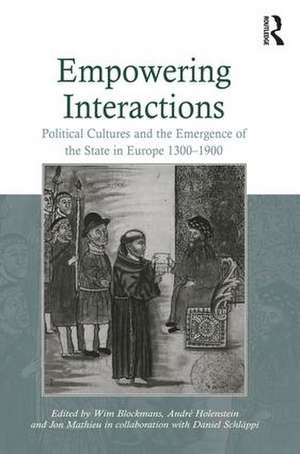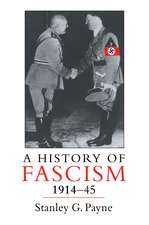Empowering Interactions: Political Cultures and the Emergence of the State in Europe 1300–1900
Autor Wim Blockmans Editat de André Holenstein Autor Daniel Schläppien Limba Engleză Hardback – 28 mar 2009
Preț: 1068.15 lei
Preț vechi: 1302.63 lei
-18% Nou
Puncte Express: 1602
Preț estimativ în valută:
204.39€ • 213.84$ • 169.79£
204.39€ • 213.84$ • 169.79£
Carte tipărită la comandă
Livrare economică 03-17 aprilie
Preluare comenzi: 021 569.72.76
Specificații
ISBN-13: 9780754664734
ISBN-10: 0754664732
Pagini: 372
Dimensiuni: 156 x 234 x 22 mm
Greutate: 0.84 kg
Ediția:1
Editura: Taylor & Francis
Colecția Routledge
Locul publicării:Oxford, United Kingdom
ISBN-10: 0754664732
Pagini: 372
Dimensiuni: 156 x 234 x 22 mm
Greutate: 0.84 kg
Ediția:1
Editura: Taylor & Francis
Colecția Routledge
Locul publicării:Oxford, United Kingdom
Recenzii
'It is the genuine achievement of "Empowering Interactions" to provide perceptive discussion and material for this challenging turn in the studies of state formation.' Zeitschrift für Historische Forschung
Notă biografică
Professor Dr Wim Blockmans, now retired from the University of Leiden, The Netherlands, Professor Dr André Holenstein, University of Berne, Switzerland and Professor Dr Jon Mathieu, University of Lucerne, Switzerland, Mr Daniel Schläppi, University of Berne, Switzerland.
Cuprins
Introduction: Empowering Interactions: Looking at Statebuilding from Below, André Holenstein; Part I Southern Europe; Chapter 1 The Construction of Local Political Identity in Lake and River Communities in North-West Italy, Twelfth to Fourteenth Centuries, Roberto Leggero; Chapter 2 Models of Government ‘from Below’ in Fifteenth-Century Lombardy. The ‘Capitoli di Dedizione’ to Francesco Sforza, 1447–1450, Giorgio Chittolini; Chapter 3 Models of Government ‘from Below’ in Fifteenth-Century Lombardy. The ‘Capitoli di Dedizione’ to Francesco Sforza, 1447–1450, Bertrand Forclaz; Chapter 4 The Politics of Mercy: Village Petitions and a Noblewoman’s Justice in the Roman Countryside in the Eighteenth Century, Caroline Castiglione; Chapter 5 The Dynamics of Law Formation in Italian Legal Science during the Early Modern Period: the Function of Custom, Roy Garré; Part II Central and Eastern Europe; Chapter 6 Threats from Above on Request from Below: Dynamics of the Territorial Administration of Berne, 1420–1450, Simon Teuscher; Chapter 7 Modes of Reading, Community Practice and the Constitution of Textual Authority in the Thurgau and Graubünden, 1520–1660, Randolph C. Head; Chapter 8 ‘God is high up, the Tsar is far away’. The Nature of Polity and Political Culture in Seventeenth-Century Russia. A Comparative View, Endre Sashalmi; Chapter 9 Communication between Authorities and Subjects in Bohemia, Hungary and the Holy German Empire, 1650–1800: A Comparison of Three Case Studies, Stefan Brakensiek; Chapter 10 Corporate Property, Collective Resources and Statebuilding in Older Swiss History, Daniel Schläppi; Chapter 11 Local Demand for Order and Government Intervention: Social Group Conflicts as Statebuilding Factors in Villages of the Rhine Palatinate, c.1760–1810, Niels Grüne; Chapter 12 Joseph-Samuel Farinet and the ‘Modern’ State: Banditry, Patronage and Resistance in Nineteenth-Century Valais, Sandro Guzzi-Heeb; Part III Northern and Western Europe – and Beyond; Chapter 13 Political Topos or Community Principle? Res Publica as a Source of Legitimacy in the French Peasants’ Revolts of the Late Middle Ages, Vincent Challet; Chapter 14 Statebuilding in Portugal during the Middle Ages: A Royal Endeavour in Partnership with the Local Powers?, Adelaide Millán da Costa; Chapter 15 Informing the Council. Central Institutions and Local Knowledge in the Spanish Empire, Arndt Brendecke; Chapter 16 Peasants and Tax-farmers in Seventeenth- Century Sweden: Local Conflict and Institutional Change, Mats Hallenberg; Chapter 17 Statebuilding with the Participation of the Estates? East Frisia between Territorial Legislation and Communalist Ritual, 1611–1744, Reemda Tieben; Part IV Historiographical and Conceptual Debates; Chapter 18 Citizens and their Rulers, Wim Blockmans; Chapter 19 Concepts and Approaches in Recent Scholarship on Statebuilding – A Critical Review, Peter Blickle; Chapter 20 No Statebuilding from Below! A Critical Commentary, Wolfgang Reinhard; Chapter 21 Statebuilding from Below – Towards a Balanced View, Jon Mathieu; Chapter 22 The Impact of Communication Theory on the Analysis of the Early Modern Statebuilding Processes, Barbara Stollberg-Rilinger; Chapter 23 Empowering Interactions and Intertwining Jurisdictions, Angelo Torre;
Descriere
This volume explores the emergence of the state in Europe between the fourteenth and nineteenth centuries. Through a series of case studies and historiographical, methodological and theoretical essays, it challenges the traditional top-down model of state development long held by historians. Instead it explores the numerous ways in which non-elite groups could influence the formation of national political institutions












